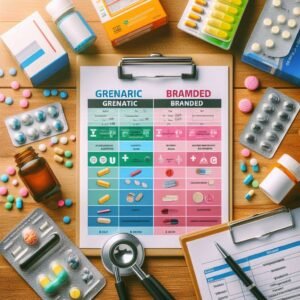
Learn Generic vs Branded Medicines, definition, key differences, and why generic medicines are cheaper with FAQs
Branded medicines are original drugs developed through extensive research and clinical trials, while generic medicines, identical in composition and effectiveness, are sold under their chemical name after the brand’s patent expires.
Generic medicines are priced lower than branded ones because manufacturers avoid the high costs of drug development and marketing. Despite the lower price, generics are FDA-approved and held to the same strict standards, ensuring they are just as safe and effective as brand-name drugs.
Branded medicines are the original products developed and marketed by pharmaceutical companies after extensive research, clinical trials, and regulatory approval. These companies hold patents that give them exclusive rights to manufacture and sell the drug for a certain period (typically 20 years).
Examples:
Generic medicines contain the same active ingredient, dosage, safety, strength, route of administration, quality, and intended use as branded drugs. However, they are sold under their chemical name after the brand’s patent expires.
Examples:
You may like:
Relative Response Factor (RRF) in Pharmaceutical Analysis
| Reason | Explanation |
|---|---|
| No R&D Cost | Generic manufacturers don’t invest in the initial drug discovery, clinical trials, or patent filing — major cost savings. |
| No Marketing Cost | Branded drugs require heavy marketing; generics don’t, as the drug is already well known. |
| Open Competition | After patent expiry, multiple companies can produce the same generic, increasing competition and lowering prices. |
| Lower Approval Costs | Generics go through an Abbreviated New Drug Application (ANDA) process — less costly and time-consuming than the original drug approval. |
| Simpler Packaging & Branding | No need for premium packaging or brand promotion. |
Yes. Regulatory authorities like the FDA (US), EMA (Europe), and CDSCO (India) require generics to meet strict standards for:
| Feature | Branded | Generic |
|---|---|---|
| Cost | High | Low |
| R&D Investment | Yes | No |
| Marketing | Extensive | Minimal |
| Approval Process | Full NDA | Abbreviated ANDA |
| Effectiveness | Proven | Equivalent |
| Manufacturer | Innovator | Any approved manufacturer post-patent |
While branded medicines lead the way through innovation and research, generic medicines offer a cost-effective alternative without compromising on safety, quality, or effectiveness. Understanding the difference empowers patients and healthcare providers to make informed, budget-friendly choices in treatment.
Generic medicines are cheaper because they don’t require the high costs of research, development, and marketing, and multiple manufacturers can produce them after the original patent expires, increasing competition and reducing prices.
Both branded and generic medicines are equally effective and safe, as they contain the same active ingredients and meet the same quality standards; the choice often depends on cost and availability.
Quick Links